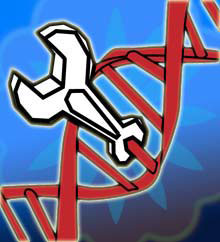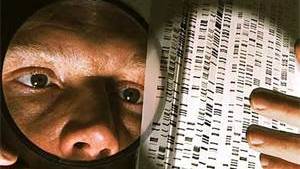DNA Factories
Source: technologyreview.com
Picked up from: radiOrbit Forum Cheaply churning out made-to-order DNA could revolutionize molecular biology.
Cheaply churning out made-to-order DNA could revolutionize molecular biology.Installing one of those prefab, snap-together wood-flooring kits is a lot easier than shaping and sanding rough planks. Adapting a similar construction strategy, a biotech startup called Codon Devices, based in Cambridge, MA, aims to streamline genetic engineering. It makes made-to-order DNA strands, freeing scientists from the finicky work it takes to put together a complicated piece of DNA the old-fashioned way.
That capability could soon change the face of molecular biology. As it becomes cheaper and cheaper to create large chunks of genetic material from scratch, scientists will be able to make ever more complex biological creations. "In the next few years, we'll probably see people engineering cells to do drug delivery or creating cellular sensors," says George Church, a professor of genetics at Harvard and one of Codon's founders. "Maybe even cells that make inorganic objects of interest, like nanostructures."
Codon was founded in 2005 just as the fledgling field of synthetic biology--the quest to design and build new life forms that can perform useful functions--was beginning to take off. The ability to make complex genetic constructs is a cornerstone of the field, allowing scientists to use chunks of DNA to design novel biological parts, which can then be inserted into bacteria or other cells. (See "Synthetic Biology on Display.")
While DNA synthesis is still too expensive to replace more-traditional molecular-biology methods on a broad scale, experts say that the DNA-synthesis market is about to boom, much as the DNA-sequencing market has in the past few years. As sequencing costs plummeted, the number of sequencing projects surged, with record numbers of genomes--even entire microbial communities--being sequenced. "As large companies begin to adopt this technology, the volumes of DNA synthesis will explode," says John Danner, president and chief executive officer of Codon. "When that happens, thousands of scientists will think about this when they go to sleep at night, and that will change how biotech is done."
Last summer, the company created what it believes was the biggest piece of man-made DNA, a 35,000 base-pair strand incorporating several genes needed to synthesize a pharmaceutical compound. The DNA was made for Microbia, another Cambridge-based biotech, which is creating microbes to manufacture specialty chemicals. But the potential applications are broad, spanning pharmaceuticals, energy, and agriculture.
Synthetic biologists are excited about the prospects, but they're still waiting for a decrease in price to the point that they can afford to do the experiments they want to do. "Cost is the critical component to making this technology work," says Chris Voigt, a synthetic biologist at the University of San Francisco. "Right now, we can design one construct that costs a fortune to make. But we want to be able to order different components put together in different ways so we can study the critical factor in putting them together."
Codon is confident that that day will soon come. It plans to use its enhanced synthesis capacity to find better enzymes for industrial processes. Since nature hasn't always come up with the most effective proteins, scientists often design a more effective enzyme by tweaking the DNA code used to make it. But it's difficult to predict in advance which tweaks will produce the best enzymes. Codon is now using its synthesis technology to carry out that process en masse--it makes millions of copies of the same genetic construct with slight variations--and then tests them to figure out which does its job best.
For example, scientists are now hot on the trail of the ideal cellulase--an enzyme that can break down cellulose in plants. More-efficient cellulases are important for producing cellulosic ethanol, which is ethanol derived from waste biomass rather than from corn starch or sugarcane, and therefore more cost-effective. "We can take the sequence for the cellulose enzyme in, say, a termite's gut, use a computer program to figure out different ways to optimize the sequence, churn out a million different versions, and then test them to find the top ten forms," says Brian Baynes, chief scientific officer and cofounder of Codon.
The same process could be used to develop protein-based drugs that can better bind to their targets or more efficiently break down a toxin in the blood. "Knowing that they can test variations of things will get molecular biologists working more like engineers," says Danner.
The company is planning to open an expanded production facility, which will operate much like any other mass-production facility, except its product will be DNA. Codon intends to build a facility, slated to open this summer, that's much larger than current needs warrant to prepare for the DNA-synthesis boom.
Article from: http://www.technologyreview.com/Biotech/18503/page2/






















